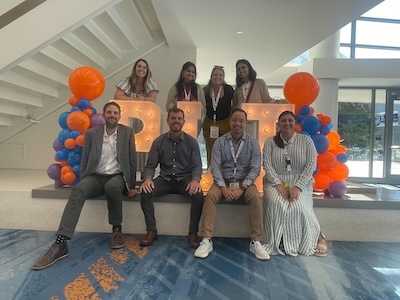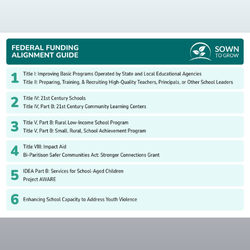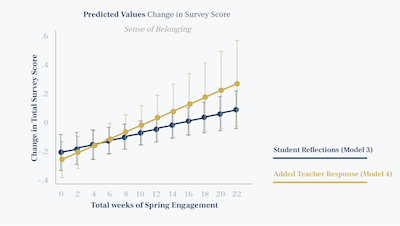The Power of Reflection: Enhancing MTSS Through Student Voice
.png)

John Dewey, a pioneering educational philosopher, once said, "We do not learn from experience... we learn from reflecting on experience."
Reflection is more than just thinking about past experiences; it's an active process of examining, analyzing, and learning from those experiences to inform future actions. In education, reflection deepens learning by helping students develop metacognitive skills - the ability to think about their own thinking and learning processes. For educators, reflection is a crucial tool for continuous improvement, allowing them to assess and refine their teaching strategies.
Reflection in the Context of MTSS:
Multi-Tiered System of Supports (MTSS) is a comprehensive framework designed to meet the academic, behavioral, and social-emotional needs of all students. Reflection plays a vital role in each tier of support:
1. Tier 1 (Universal Support): Reflection helps educators assess the effectiveness of core instruction and identify areas for whole class focus. This is crucial because a strong Tier 1 foundation ensures that all students receive high-quality, evidence-based instruction, potentially reducing the number of students requiring more intensive interventions and identifying support pathways for students that do need Tier 2 or Tier 3 pathways.
2. Tier 2 (Targeted Support): Reflective practices enable teachers to evaluate the impact of interventions, particularly in small-group settings, and make data-driven decisions. This is important because it allows educators to fine-tune their approaches for students who need additional support beyond Tier 1. By reflecting on the effectiveness of small-group interventions, educators can ensure that students receive more targeted, appropriate, and effective support tailored to their specific needs.
3. Tier 3 (Intensive Support): In-depth reflection is crucial for tailoring highly individualized interventions and tracking progress. This level of reflection is essential because it helps educators address complex learning challenges, adjust strategies as needed, and ensure that students with the most significant needs receive comprehensive, personalized support.

Practical Strategies for Implementing Reflection in MTSS:
Tier 1 (Universal Support):
1. Reflective Journaling: Encourage all students to maintain journals where they reflect on their learning experiences, challenges, and successes. This strategy promotes self-awareness and metacognition, helping students identify their own strengths and areas for improvement. It also provides valuable insights for educators to tailor their universal support within the MTSS framework.
2. Goal-Setting and Review: Implement a cyclical process of setting goals, working towards them, and reflecting on the outcomes for all students. This approach fosters student ownership of their learning and helps align individual goals with the universal support provided in MTSS. Regular review of these goals allows for timely adjustments to classroom-wide strategies.
3. Whole-Class Reflective Check-ins: Implement regular, structured whole-class discussions where students reflect on their learning experiences, challenges, and well-being. This practice helps create a supportive classroom environment and allows educators to identify common trends or concerns that might require adjustments to Tier 1 strategies. It also provides an opportunity for students to develop self-awareness and emotional intelligence, key components of social-emotional learning within the MTSS framework.
Tier 2 & Tier 3 (Targeted and Intensive Support):
4. Student-Led Conferences: Implement regular student-led conferences where students reflect on and present their progress, challenges, and goals to families and school staff. This approach empowers students, encourages deeper reflection, and provides a collaborative platform for addressing specific needs within the MTSS framework. By allowing students to guide the conversation, these conferences can reveal unique insights, leading to more personalized and effective Tier 2 interventions.
5. Collaborative Support Team Meetings: Implement regular Coordination of Services Team (COST) meetings or similar collaborative sessions involving educators, support staff, and when appropriate, students and family members. These meetings should focus on:
- Analyzing academic data (e.g., progress on learning goals, assessment scores)
- Reviewing well-being indicators (e.g., emotional state, stress levels, sense of belonging)
- Examining engagement metrics (e.g., participation rates, task completion)
- Incorporating student reflections gathered through check-ins or journaling
These collaborative sessions provide a holistic view of student progress, challenges, and needs, ensuring that Tier 2 and Tier 3 interventions are comprehensive, well-coordinated, and responsive to student voice. By combining quantitative data with qualitative student reflections, support teams can make more informed decisions about interventions and adjust strategies as needed within the MTSS framework.
Additionally, for students receiving intensive support, consider implementing structured reflective practice sessions where they can engage in deeper reflection on their individualized goals and strategies. This practice encourages self-advocacy and allows educators to adjust interventions based on the student’s insights, ensuring that support is tailored to their unique circumstances.
By combining data-driven discussions with opportunities for student reflection, support teams can make more informed decisions about interventions and adjust strategies as needed within the MTSS framework.
Reflective practices and student voice are essential components of an effective MTSS framework. By incorporating these elements, educators can create more responsive and inclusive learning environments. Sown To Grow (STG) exemplifies these principles by:
- Empowering Student Voice: STG allows students to set goals, track progress, and reflect on their learning, promoting active participation in their educational journey.
- Facilitating Reflection: Regular check-ins and guided prompts help students develop metacognitive skills, fostering self-awareness and self-regulation.
- Data-Informed Decision Making: STG provides real-time insights into student progress and well-being, enabling targeted interventions across all tiers of support.
- Collaborative Problem-Solving: Student-led conferences and data-informed meetings encourage collaboration among students, educators, and families, promoting a holistic approach to support.
By modeling these practices, Sown To Grow not only enhances MTSS implementation but also cultivates a culture of reflection and empowerment. As we evolve our educational practices, tools like STG are vital in ensuring that student voices remain central to creating effective and inclusive learning environments.



.png)

.png)



.png)
.png)
.png)
.png)

.png)
.png)
.png)
.png)






